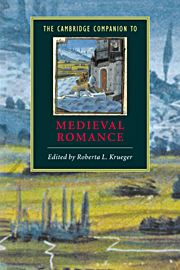Book contents
- Frontmatter
- Introduction
- Part 1 The origins, forms, and contexts of medieval romance
- Part 2 European romance and medieval society
- Part 3 European transformations
- 10 The evolution and legacy of French prose romance
- 11 Medieval German romance
- 12 Chivalry and medieval Italian romance
- 13 Gawain and popular chivalric romance in Britain
- 14 Middle English romance
- 15 Romance at the crossroads
- Editions and translations
- Index
- Series list
10 - The evolution and legacy of French prose romance
from Part 3 - European transformations
Published online by Cambridge University Press: 28 May 2006
- Frontmatter
- Introduction
- Part 1 The origins, forms, and contexts of medieval romance
- Part 2 European romance and medieval society
- Part 3 European transformations
- 10 The evolution and legacy of French prose romance
- 11 Medieval German romance
- 12 Chivalry and medieval Italian romance
- 13 Gawain and popular chivalric romance in Britain
- 14 Middle English romance
- 15 Romance at the crossroads
- Editions and translations
- Index
- Series list
Summary
French romances occupy a central position in the development of medieval European literature. Their most popular subject matter by far was the Arthurian legend, which, though it had its origins elsewhere, was first cast in romance form in France: the Round Table, the tragic love story of Lancelot and Guinevere, and the notion of the Grail quest were all French innovations. So too was the very genre of romance, a sophisticated and complex form that dramatized quests and tests and explored the connections - and often the conflicts - of love and adventure.
The legacy of French romance in other literatures is almost incalculable. Writers in every language of Western Europe adapted or translated French texts; and even when they were not openly reworking French sources, indeed even when they sought to assert their independence from those sources, their own romances frequently betray a decided Gallic influence in their use of the structures and conventions of romance, their borrowing of popular motifs or characters, or their rhetorical procedures.
Throughout the second half of the twelfth century, with the great masterpieces of Chrétien de Troyes, the Tristan and Iseut romances of Thomas and Béroul, and a number of other works, verse had been the preferred vehicle for the composition of romances, which were generally intended to be read aloud before groups of listeners. Prose was at that time reserved largely for history writing, for legal documents, and for sermons and other religious texts.
- Type
- Chapter
- Information
- The Cambridge Companion to Medieval Romance , pp. 167 - 182Publisher: Cambridge University PressPrint publication year: 2000
- 2
- Cited by



